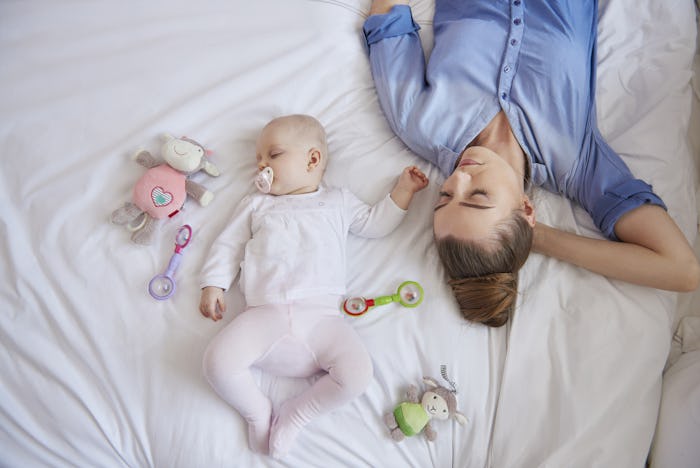Co-sleeping is a hot topic, whether it's a parenting decision you've made for your family or not. For some families, there's no question about it — co-sleeping works. For others, there is not a bed big enough to make sleeping with their children comfortable. (I'm kind of in this camp.) Both sides argue about how they think co-sleeping affects their child, but does co-sleeping affect you as a parent? What does co-sleeping do to your body?
If you're counting the bruises you have from tiny toddler feet kicking you in the ribs all night, I get it. But co-sleeping affects your body in a biological way, too — it turns your body into a regulator of your baby's physiology.
You've probably already been impressed with what your body is capable of, seeing as you've had a child, but co-sleeping can really make you look at your body in a new light. According to the Mother-Baby Behavioral Sleep Laboratory of the University of Notre Dame, an infant's brain is only 25 percent developed at birth. Your baby is already depending on you to help them grow and continue to develop, but the University noted that your sleeping body next to your baby gives your child the physiological regulation and support they need, especially if you're breastfeeding. Mothers who co-sleep and choose to breastfeed can feed their baby on demand, meeting their child's nutritional needs, without either the mother or baby missing out on sleep according to KellyMom.
Breastfeeding isn't the only need met by your body while co-sleeping. The University's findings concluded that the immaturity of your baby's thermo-regulatory system, immune system, and cardio-respiratory system, adapt and develop because of the closeness to your body. Not to mention, your body literally attaches itself to your baby while co-sleeping, encouraging your child's emotional development and psychological system.
La Leche League International also noted that your body is basically a wonderland thanks to co-sleeping. When your child feels the rhythm of your chest, it actually regulates their own breathing. Even the carbon dioxide you're expelling as you sleep stimulates your baby's breathing and can actually help them catch their breath if they are ever in a situation where they are having trouble.
And all of that co-sleeping does more than just turn your body into a literal powerhouse for your baby. It also helps you relax. One study found that the skin-to-skin contact between mothers and their babies can actually lower a mother's anxiety.
Amazing, right? Your body was once a vessel to protect and nourish your baby, and now just being close to your little one while sleeping continues to do the same. Not to mention those arm muscles you're gaining from catching your child as she catapults off the edge of the bed for breakfast or the upper body strength from holding on to one side of the mattress as you fight for an inch of space.
